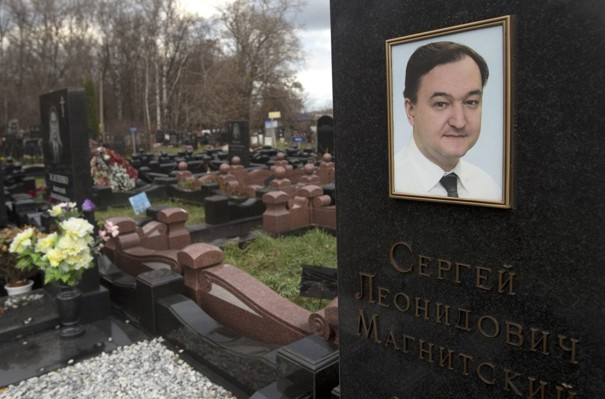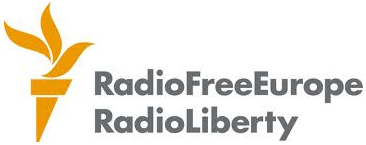
THE VOICE OF INTERNATIONAL LITHUANIA
|
VilNews has its own Google archive! Type a word in the above search box to find any article.
You can also follow us on Facebook. We have two different pages. Click to open and join.
|

A tombstone on the grave of lawyer Sergei Magnitsky, who died in jail, at a cemetery in Moscow. A new law blacklists Russians connected to the death of Magnitsky in police custody.
The Washington Post
MOSCOW — The U.S. Senate on Thursday repealed a trade sanction imposed 38 years ago to force the Soviet Union to allow Jews and other religious minorities to emigrate, replacing it with a modern-day punishment for human rights abuse that has enraged Russian officials.
The old law, one of the last vestiges of the Cold War, was called the Jackson-Vanik Amendment, named after a U.S. senator and a representative. The new law, passed 92 to 4, grants Russia and Moldova permanent normal trade relations, but it is coupled with the Sergei Magnitsky Rule of Law Accountability Act, which honors a dead Russian. The law blacklists Russians connected to the death of Magnitsky in police custody and to other gross human rights violations, prohibiting entrance to the United States and use of its banking system. office in 2000, Vladimir Putin has expanded the powers of Russia's presidency, consolidating authority in the Kremlin and weakening other democratic institutions.
“Today, we close a chapter in U.S. history,” Sen. Benjamin L. Cardin (D-Md.), one of the prime movers of the Magnitsky bill, said during the debate on Jackson-Vanik. “It served its purpose. Today, we open a new chapter in U.S. leadership for human rights.”
How the United States can best promote democracy and human rights in Russia — and elsewhere — became a matter of agonizing and often bitter debate as pressure grew to repeal Jackson-Vanik. Not only was it widely considered a relic with the dissolution of the Soviet Union in 1991 and freedom to emigrate from Russia, but, under the regulations of the World Trade Organization, which Russia joined this year, it also penalized American exporters.
The House approved the measure last month. President Obama said he looked forward to signing the law because of the WTO benefits for American workers, although originally the administration had argued that the Magnitsky bill was unnecessary because the president could — and would — create the desired blacklist by executive order.
“My administration will continue to work with Congress and our partners to support those seeking a free and democratic future for Russia and promote the rule of law and respect for human rights around the world,” Obama said in a statement.
“We need the Magnitsky act to fill the gaps in President Obama’s policy,” said Sen. Orrin G. Hatch (R-Utah), criticizing Obama for what he called unseemly efforts to avoid offending Russian President Vladimir Putin.
Russia, as expected, was infuriated. Speaking in Brussels on Thursday, Moscow’s special representative on human rights and democracy predicted a tough response, Interfax reported.
“We regard it as unjust and unfounded,” Konstantin Dolgov said. “This is an attempt to interfere in our internal affairs.”
Sen. Jon Kyl (R-Ariz) said the bill should have applied to all countries. The House, however, had already passed the Russia-centric bill, and the Senate decided to go along.
Sen. Jeanne Shaheen (D-N.H.) said, though, that the United States intends to pay attention to human rights everywhere.
“We will stand up for those who dare to speak out against corruption,” she said. “This bill is for all the Magnitskys around the world.”
Cardin, chairman of the U.S. Helsinki Commission, has been pushing for a Magnitsky law since 2010, when most of his colleagues stumbled over pronouncing the Russian name. Debating the bill Wednesday, senator after senator recounted Magnitsky’s life story, his name rolling familiarly off their tongues.
Magnitsky was working for an American law firm in Moscow, advising Hermitage Capital on tax issues, when he discovered a $230 million tax fraud being carried out by Russian police and tax officials using documents stolen from the investment company, run by the American-born William F. Browder.
When Magnitsky accused officials, they arrested him. Magnitsky died in pretrial custody in November 2009 after nearly a year in jail. Despite evidence that he had been beaten and tortured, no one has been punished, and Magnitsky is being prosecuted posthumously.
Browder first testified to the Helsinki Commission about Magnitsky’s imprisonment several months before the Russian’s death. On Thursday, he said he hoped the Senate action would encourage passage of a similar law in Canada and Europe.
Sen. John McCain (R-Ariz.) said the United States had a moral obligation to speak out for Magnitsky, as well as others who are still alive and languishing unjustly in Russian prisons.
“I continue to worry about them,” McCain said, “and I pray for them.”

U.S. LIFTS RUSSIA, MOLDOVA TRADE BARRIERS;
PASSES MAGNITSKY SANCTIONS
Richard Solash
December 6, 2012
WASHINGTON -- The U.S. Senate has voted to permanently lift Cold War-era barriers to trade with Russia, a move long sought by Moscow that could increase commerce between the countries by billions of dollars.
In the same vote on December 6, senators also backed sanctions against Russian officials implicated in the death of anti corruption lawyer Sergei Magnitsky and in other perceived gross rights violations in Russia.
Moscow has railed against that move, which has overshadowed the trade benefits to come.
The Senate's 92-4 vote follows the passing of the bill in the U.S. House of Representatives in November. In a statement, U.S. President Barack Obama said "I look forward to receiving and signing this legislation."
When he does, Moscow will be exempted from the 1974 Jackson-Vanik Amendment, which imposed trade restrictions on the Soviet Union for its policy of limiting Jewish emigration. The restrictions have been waived for nearly two decades but remained on the books as a symbol of U.S. objections to Russia's human rights record.
Citing the weak U.S. economy, the White House had pushed Congress to lift the restrictions and grant Permanent Normal Trade Relations (PNTR) status to Russia, the world's seventh-largest economy.
The move allows the United States to take full advantage of Moscow’s August entry into the World Trade Organization, which has already benefited China and Europe.
Over White House objections, lawmakers from both parties said they would only agree to lift the restrictions if the Sergei Magnitsky Rule of Law Accountability Act were passed concurrently.
The legislation requires Obama to deny visas to, and freeze the U.S.-based assets of Russian officials whom the United States has implicated in Magnitsky’s prosecution and death, as well as officials implicated in other gross violations in Russia who have acted with impunity.
In determining who will be sanctioned, the president is expected to work from a list of more than 60 Russian officials compiled by lawmakers who introduced the legislation.
Obama can decide to keep the identities of some of the sanctioned officials classified for national security reasons.
'A New Chapter On Human Rights'
Senator Benjamin Cardin (Democrat-Maryland), the earliest and most passionate advocate of sanctions in Congress, told reporters after the vote that it signaled "a new [U.S.] chapter on human rights."
Senator John McCain (Republican-Arizona) said, "Sergei Magnitsky was an ordinary man, but he became an extraordinary champion of justice, fairness, and the rule of law in Russia, where those principles have lost nearly all meaning."
"I think we are sending a signal to Vladimir Putin and the Russian kleptocracy that these kinds of abuses of human rights will not be tolerated without us responding in some appropriate fashion," McCain said.
U.S. rights NGOs also hailed the passage of the measures.
The 37-year-old Magnitsky died in a Moscow prison three years ago after implicating top officials in a scheme to defraud the government of $230 million.
He was repeatedly denied medical care and allegedly tortured during nearly a year in pretrial detention on what supporters say were trumped-up financial-crime charges.
Russia has prosecuted only one low-level prison official linked to his death, while promoting a number others implicated in the case.
Moscow Slams 'Vengeful' Move
The incident prompted an international outcry and several Western countries are considering enacting Magnitsky-related sanctions.
Moscow's reaction to the U.S. move was swift. In a statement, the Russian Foreign Ministry called the vote "vengeful" and a "performance in the theater of the absurd" that would "negatively affect prospects for cooperation."
Aleksei Pushkov, the chairman of the State Duma, said Moscow could pass similar legislation against U.S. nationals "who have been involved in mass violations of human rights in Afghanistan, Iraq, Libya, and some other countries" and could also respond "asymmetrically."
Later, Foreign Minister Sergei Lavrov said Russia will deny visas to U.S. officials who, as he put it, violate human rights.
Quoted by Russian media, Lavrov said he had informed U.S. Secretary Hillary Clinton of Moscow's planned action during a meeting in Dublin on December 6.
In a telephone interview with Russian television on December 7, Russian Foreign Ministry spokeswoman Maria Zakharova said the move will have "a very negative effect on our future bilateral cooperation."
"Washington must have forgotten what year it is and continues to think that the Cold War still goes on," Zakharova said, "or the senators are too involved in their personal public relations and they ignore the obvious: each side can already deny entry to its territory to anyone it finds necessary; there is no need for any special legislative act."
Other Russian lawmakers called the U.S. move "hostile," "cynical," and "anti-Russian."
U.S. analysts have suggested that Moscow could also target U.S.-supported civil society initiatives in the country.
David Satter, a senior fellow at Washington's Hudson Institute, suggests that Moscow might respond to the U.S. move by "taking out their anger in unrelated cases" or increasing its anti-American rhetoric. But he maintains that the Russian authorities may be reluctant to mention the sanctions directly.
"I'm not certain that, in terms of their public posture, Russian officials are going to want to call the attention of the Russian population to this piece of legislation," Satter says, "because that also calls the attention of people to [the government's] own abuses."
The U.S. Senate also joined the House of Representatives in voting to grant Moldova normalized trade status, a victory for Europe's poorest country.
In a statement, Chisinau's embassy to Washington told RFE/RL it "strongly welcomed" the vote, which it called "a clear sign of the support for the country."
It called the Jackson-Vanik exemption a "well-deserved and somehow-delayed response to the political changes in Moldova."
________________________________________
Radio Free Europe/Radio Liberty © 2012 RFE/RL, Inc. All Rights Reserved.
http://www.rferl.org/content/us-senate-jackson-vanik-trade-barriers-magnitsky-sanctions/24791534.html
- Bookmark :
- Digg
- del.icio.us
- Stumbleupon
- Redit it
VilNews e-magazine is published in Vilnius, Lithuania. Editor-in-Chief: Mr. Aage Myhre. Inquires to the editors: editor@VilNews.com.
Code of Ethics: See Section 2 – about VilNews. VilNews is not responsible for content on external links/web pages.
HOW TO ADVERTISE IN VILNEWS.
All content is copyrighted © 2011. UAB ‘VilNews’.

 Click on the buttons to open and read each of VilNews' 18 sub-sections
Click on the buttons to open and read each of VilNews' 18 sub-sections 


